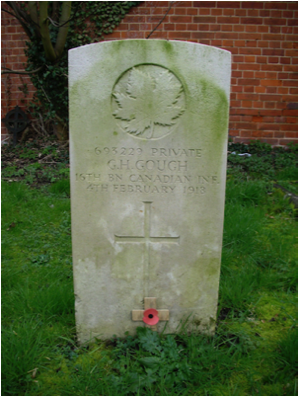George Henry Gough was born in Cheshire and emigrated to Canada where he was a farmer in Saskatchewan. He joined the army in November 1916 and served in France where he was badly wounded. He was brought to England for medical treatment and taken to Hylands Auxiliary Military Hospital where he died in February 1918. He was buried at St. Mary’s Church in Widford.
GOUGH, GEORGE HENRY*,
Private, 16th Battalion, Canadian Infantry
George was badly wounded, suffering from gunshot wounds the face, wrist, and shoulder, and fractured skull, and brought back to England for further treatment. He had been at the Hylands Auxiliary Military Hospital in Widford for three days when his condition worsened and it was found necessary to operate immediately. but died four hours later on 4th February 1918.
He was buried with full military honours St. Mary's Church in Widford Church on Thursday 7th February 1918. The burial service was conducted the Rev C. E. Buck. United Army Board Chaplain. George's brother Private James Gough of the same regiment, who had been wounded three times, and was still a patient at a Canadian Hospital at Orpington, attended the funeral. Among those also present were Sir Darnel and Lady Gooch, Mr. R. A. D. Libert, hon. sec. of the Hospital, orderlies and patients, Capt. Langdon, C. F. and others. Wreaths were sent by Sir Daniel and Lady Gooch the staff at Hylands Hospital and patients. The firing party was provided by, the Warwickshire Regiment.
The auxiliary military hospital at Hylands House had established in the first few weeks of the war in August 1914 when the owner of the Hylands Estate, Sir Daniel Gooch, Bart., offered the building to the Red Cross. Initially it was used for soldiers of the South Midland Division which was billeted in the Chelmsford area in the early months of the war. Hylands became the headquarters of the 2nd and 3rd South Midland Field Ambulance. Over 500 patients had been through the wards by October 1914 when the military transferred from Hylands to a hospital established at Oaklands Park, Chelmsford, making way for Belgian wounded. Later that month the hospital received its first British Expeditionary Force eases who had arrived in Harwich. The hospital continued to take ail the heaviest oases from the Middlesex War Hospital, Clacton-on-Sea, and the General Military Hospital, Colchester. The hospital was closed in April 1919.
130511

George was born in Birkenhead, Cheshire on 25th August 1895, the son of James Gough. His family emigrated to Canada in the period between George's birth and the start of the First World War.
On 10th November 1916 George attested to join the 174th Battalion (Cameron Highlanders of Canada) at Winnipeg, Manitoba, Canada. At the time he was a farmer living at Moose Jaw, Saskatchewan in Canada and had previous military experience with the 79th C. H. of C. militia and 7 Mos. 99th Regiment Brandon. His next of kin was his father who lived at 324 Main Street South, South Hill, Moose Jaw. He was 21 years, who months old, five feet seven inches tall, had a 36 inch chest (expandable by five inches), fair hair, blue eyes, light brown hair and was a member of the Church of England.
George subsequently served as Private 693229 in the Machine Gun Section of the 16th Battalion Canadian Infantry.
The battalion had sailed for England on 3rd October 1914 and then sailed for France on 12 February 1915, disembarking at St. Nazaire three days later. The 16th Battalion took part in all the major engagements of the Canadian corps, including the battles of Ypres, the Somme, Vimy Ridge, and Passchendale.